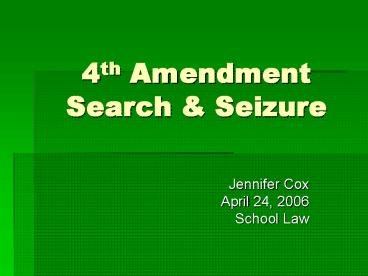4th Amendment Search - PowerPoint PPT Presentation
1 / 16
Title:
4th Amendment Search
Description:
Contraband seized was in plain view and is not an unreasonable search. Judicial Cases (cont. ... Category 2: Health/Safety Inspections and Plain View Contraband ... – PowerPoint PPT presentation
Number of Views:1120
Avg rating:3.0/5.0
Title: 4th Amendment Search
1
4th AmendmentSearch Seizure
- Jennifer Cox
- April 24, 2006
- School Law
2
The 4th Amendment
- The right of the people to be secure in their
persons, houses, papers, and effects, against
unreasonable searches and seizures, shall not be
violated, and no Warrants shall issue, but upon
probable cause, supported by Oath or affirmation,
and particularly describing the place to be
searched, and the person or things to be seized.
3
Exceptions to Warrant Requirement
- Searches require warrants with the exception of
- Consent
- Motor Vehicles
- Plain View
- School Searches
- New Jersey v. T.L.O.
4
New Jersey v. T.L.O.(Recap)
- Student was expelled from school and sued stating
that the search was illegal. - Court gave three requirements for permissible
searches - Justification at its inception
- Reasonable grounds for believing that a law or
school rule or regulation had been violated. - Reasonable scope in light of age, gender, and the
nature of the infraction. - Court upheld ruling, that search was permissible.
- However, what about searches in student residence
hall rooms?
5
In loco parentis
- In loco parentis
- Latin for in the place of a parent
- Concept is applied less to college students
because a majority of students are 18 or older,
therefore they are considered to be adults. - Moore v. Troy State University (1968)
- The college does not stand, strictly speaking,
in loco parentis to its students, nor is their
relationship purely contractual in the
traditional sense. The relationship grows out of
the peculiar and sometimes the seemingly
competing interests of college and student
6
Consent to Search
- Two consent issues that arise in residence hall
searches - Does a student consent to have his/her room
searched by signing a housing contract? - Can a university official consent to a
third-party search by police?
7
Housing Contracts
- College students typically sign housing
contracts to live on-campus. Handbooks
containing policies are generally available. - These agreements include provisions that allow
authorized university personnel to enter the room
for purposes of inspections, improvements, or
repairs.
8
Residence Hall Policies
- Students are expected to conduct themselves in a
manner which shows respect for the rights and
privacy of others, the University, personal
property, and local, State and Federal laws. - -CNU Housing Contract 2006-2007
- Therefore, students who live on-campus must
follow - Federal, State, and Local Laws
- University Regulations
9
Judicial Cases
- State of Arizona v. Kappes (1976)
- The right of privacy protected by the fourth
amendment does not include freedom from
reasonable inspection of a school-operated
dormitory room by school officials - Student acknowledges this when he/she signs a
housing agreement and accepts the room under the
conditions mentioned in the contract. - Contraband seized was in plain view and is not an
unreasonable search.
10
Judicial Cases (cont.)
- State of Utah v. Hunter (1992)
- Students attending a university require and are
entitled to an atmosphere that is conductive to
educational pursuits. In a dormitory situation,
it is the university that accepts the
responsibility of providing this atmosphere - The housing contract signed by Hunter further
lends support that the search was reasonable. - Lower courts said that the evidence should be
suppressed, court of appeals overturned.
11
3rd Party Search
- Can university officials consent to a third-party
search by police? - What if there is an educational purpose behind
the search? - Moore v. Troy State University The federal
district court held that university officials can
consent to searches. Reasoning Drug search could
serve an educational purpose. - Smyth v. Lubbers The federal district court
stated that university officials can not consent
to searches. Reasoning A drug search does not
serve an educational purpose.
12
Judicial Cases
- Piazzola v. Watkins (1971)
- A University regulation cannot be construed or
applied so as to give consent to a search for
evidence for the primary purpose of a criminal
prosecution. Otherwise, the regulation itself
would constitute an unconstitutional attempt to
require a student to waive his 4th Amendment
protection. - Quote from People v Cohen
- This was, in essence, a fishing expedition
calculated to discover narcotics. It offends
reason and logic to suppose that a student will
consent to an entry into his room designated to
establish grounds upon which to arrest him.
13
Case Study/Discussion
14
Other things to consider
- The Exclusionary Rule
- If there is a 4th Amendment violation, the court
must decide whether evidence should be excluded
from criminal and/or university proceedings. - Due Process and the 14th Amendment
- Procedural Fair and just legal procedures.
- Substantive Justification
- State vs. Private Actors
- Courts have focused on whether the official
conducting the search can be considered a state
actor.
15
Stanleys Categorizationfor Residence Hall
Searches
- Category 1 Traditional Law Enforcement
- Warrant Probable Cause Needed
- Category 2 Health/Safety Inspections and Plain
View Contraband - No warrant or probable cause needed
- Category 3 Search by University for Contraband
- Probable cause needed
- Warrant is not needed
16
Conclusion
- Rulings can vary depending upon state actors
versus private actors - Housing contracts tend to be upheld as consent to
search, especially in regards to health and
safety inspections. - Rulings vary on 3rd party searches.































